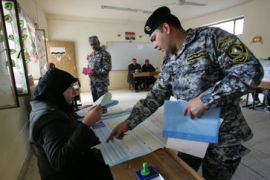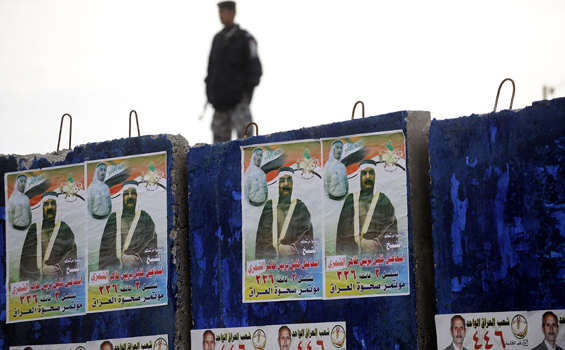A guide to Iraq’s provincial polls
Iraq uses “open list” system to select provincial council members.

 |
| Iraqi police patrol the polling station of the city Balad Ruz for the 2009 elections [AFP] |
Nearly 15 million Iraqis are eligible to cast their votes at polling stations in 14 of 18 provinces as Iraq holds its first provincial elections since 2005.
More than 14,400 candidates will vie for 440 provincial council seats on January 31 in an electoral system Iraqis hope will help balance the power in a nation dismantled by sectarian warfare.
Some analysts are predicting a massive Sunni Arab turnout and Sunni parties, many of which boycotted the last provincial polls in 2005, are hoping to gain a greater share of local power.
Kirkuk will not hold elections as its status remains in dispute.
Iraq’s parliament reached a compromise in October 2008 which allows Kirkuk’s elections to be delayed until a power-sharing agreement can be reached between the city’s Kurdish, Arab and Turkmen communities.
In the meantime, the Kurdish Regional Government will decide when the three Kurdish provinces of Dohuk, Irbil and Sulaymaniyah will hold their vote
Provincial council seats
The 2009 elections mark an important change in the electoral system.
| Factfile |
|
|
In 2005, provincial and national elections were conducted under a “closed list” electoral system, in which voters selected a party or coalition that in turn selected the individual party member to fill the parliament or council seat.
Voters did not know who was on the list because the Iraqi electoral commission had cited sectarian violence and security precautions as reasons to conceal candidates’ names.
Such a system paved the way for widespread accusations of corruption and fraud with allegations that some parties relied on family ties and allies to allot seats.
This year, however, Iraqis will be able to cast their votes for either a political party, coalition or an individual candidate in an “open list” system that allows for direct representation and greater transparency.
Iraqis will be electing provincial council members, who are then assigned the responsibility of electing a new governor for each province.
The number of tallied votes will determine the positions on the council that the individual or the party will receive.
Both council bodies and governors hold significant authority under the June 2008 provincial powers law.
Minorities
While the large ethnic and religious sects within Iraq will play a vital role in the upcoming elections, minority groups have accused the Iraqi parliament of ignoring their roles in Iraqi society.
The United Nations recommended that a total of 12 seats be distributed across the country’s minority provincial councils for Christians, Yazidis, Shabaks and Sabians.
However, parliament alloted only six seats.
The minority clause of the election law, which was finalised on November 3, 2008, provided three seats for Christians, and one each for Yazidi, Mandean and Shabak representatives.
The Christians attained a seat in Baghdad, the capital, Nineveh and Basra, while the Yazidis attained one in Nineveh and the Mandeans one in Baghdad.
According to Iraq’s electoral commission, 3,912 candidates or 27.12 per cent of the people contesting the election are women.
But although the election law guarantees the elected councils would be composed of at least 25 per cent women, article 11 of the final version stated that “a woman would be given a seat at the end of every three winners”.
This was interpreted by the electoral commission to mean that if a list wins more than two seats in a specific province, the third seat will be granted to a woman from the party list.
Female MPs voiced concerns that this interpretation will weaken their position in the elections as a list that wins one or two seats will be under no compulsion to appoint a woman.
If a party list receives more than three seats the total number of seats will be divided by three, and then rounded off downward to calculate the number of seats for women.
The first results were expected to be published on February 3.

 Elections are being held in 14 provinces of 18 total
Elections are being held in 14 provinces of 18 total